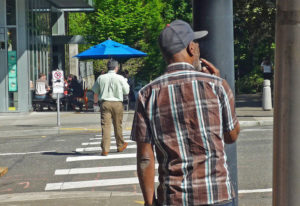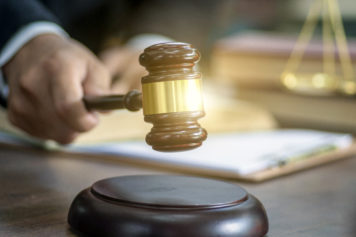
Do Portland drivers exhibit racist tendencies at crosswalks? Yes, according to a new PSU study. (PSU)
Black men often have trouble hailing a cab in New York City, but a new study shows they also have trouble getting cars to stop for them at crosswalks.
A study by the University of Arizona and Portland State University found that Black pedestrians had to wait longer to cross than white ones. The study showed Black pedestrians waited 32 percent longer than white pedestrians to cross and were twice as likely to see multiple cars pass before one stopped.
The research project employed three Black men and three white men in their 20s, who all dressed similarly. The test subjects each crossed the road 15 times. The researchers observed 173 drivers in downtown Portland. Researchers said the study would aid in transportation planning. It also sheds light on other biases in employment and medical treatment, reported The Phoenix Business Journal.
Although many on the right, such as Chief Justice John Roberts, would like to believe racism and bias are a thing of the past, study after study has found that Americans often practice bias in hiring practices, financial decisions and even medical treatment.
According to an Atlanta Blackstar article, a study published by JAMA Internal Medicine found Black, brown, less educated and unemployed people had to wait 25 percent longer than white people to receive medical treatment. JAMA Pediatrics also found that Black children were less likely to receive pain medication than white children.
And The View host Raven-Symone had to issue a hasty apology after she said that she wouldn’t hire anyone with a “ghetto” name. As ignorant as she sounded, Raven-Symone was merely vocalizing a practice that is all too common in Corporate America.
“Drivers were clearly displaying behaviors consistent with implicit racial bias,”said Arlie Adkins, a University of Arizona transportation planning expert. “We were surprised at just how stark the difference was.”
Tara Goddard, a Portland State University researcher, said she was also surprised at the differences revealed in the study.
“It’s amazing to look at something you thought might be subtle and to see it instead so clearly,” Goddard told Oregonlive.com. “Racial bias applies to so many areas of life, so it makes sense that it takes place in traffic. But nobody has looked at it like this before.”
Portland State University researcher Kimberly Kahn said the study indicated how widespread bias was in society.
“We are not saying drivers are overtly racist,” Kahn said. However the study showed drivers were following racial prejudices. “These subtle forms of stereotyping are pervasive across society, and the majority of Americans hold some level of subconscious bias or association just by growing up in this culture.”
The study also said statistics from the Centers for Disease Control showed that Black and Hispanic men were twice as likely to die in pedestrian-related accidents than white men.
“While implicit bias does not explain the disparity in safety outcomes, it may be a contributor,” Adkins said. “These microaggressions in different contexts add up to become a very negative situation for some people. It is a problem if people feel threatened, or if they are treated unequally.”
The researchers say part of the reason why they conducted the study was to find ways to reduce pedestrian fatalities. According to the University of Arizona News, the team plans to take the study nationwide and raise awareness about pedestrian safety.
“We want this work to continue, and it will be very important to see if there are disparities in other parts of the country,” Adkins said.


